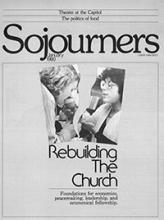In his first sermon, Jesus said, "Repent, for the kingdom of heaven is at hand" (Matthew 4:17). That is the church's message. But, sadly, there is little evidence in the way Christians live to support our claim that the kingdom of heaven is at hand. Rather, the evidence would suggest that, in most churches, the culture of the economic, political, and military systems of the United States is at hand. The question must be asked why the churches do not live by their confession.
At a conference of Christians in New York City in the late 1970s, an American Indian said, "Regardless of what the New Testament says, most Christians are materialists, with no real experience of the Spirit, and most Christians are individualists, with no real commitment to community." He looked over the group of theologians, clergy, and Christian leaders and continued, "Let's pretend that you all were Christians. You would not accumulate, you would actually love one another, you would share everything you had with each other and with the poor, and you would treat each other as if you were a family." He finished with a question: "What is it that keeps you from doing that?" Not one had a good answer to his question.
At one time I thought the reasons the church didn't live by what it said had mostly to do with lack of will, bad intentions, and self-interest. While all those problems are present, I now think the reasons are much deeper.
The Christian community is guilty of forgetting--forgetting who we are and to whom we belong. Throughout history, when the people of God have forgotten who they are, they have always fallen into idolatry. Christians are controlled by forces stronger than anything offered in the church's life. We have not the strength to resist those forces, or worse, to even see the need for resistance.
Read the Full Article

